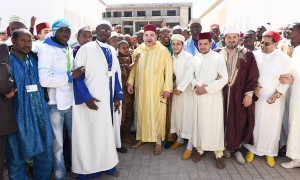ANSAmed
(by Diego Minuti)
ROME – The battle against the misleading distortions of religion cannot be won in a day. Morocco is well aware of this and has perhaps won this fight thanks to a farsighted program which, training imams, keeps pilgrims away from the risk of being used for ends that have little to do with Islam.
Countries in North Africa have for years been at the center of concentric action brought forward by the Islamic factions that consider themselves to be the most orthodox and which, as an expression of the rick oil kingdoms in the Gulf, have the means and tools to make their penetration effective.
Morocco, whose king Mohamed VI has the title of ”commander of believers”, has experienced first hand Islamic terror (as in the case of the Casablanca attacks). However, rather than giving in to emotions, he started a program to train imams (who are under the ministry for religious affairs) to ”vaccinate” them from the dangers of a subversive contamination of Islam.
Indeed the kingdom – beyond single cases of extremism – appears today stronger in its role as an illuminated Islamic state.
It is no easy job but Morocco is collecting the benefits. It is actually pursuing even more ambitious plans, as confirmed by the inauguration in Rabat of an Institute (called after Mohamed VI in the university district of Madinate Al Irfane) to train imams, both Moroccan and foreign.
And the definition of ”morchidines”, as recited by an official document creating the Institute, opens the door to other countries which, recognizing the validity of the Moroccan model, will send their ulemas in the certainty that they will come back home stronger in their being an expression of enlightened Islam, that of the ”middle path”.
A confirmation of this is that the next training courses at the Institute (which has 1,000 places and has attracted an investment of 230 million dirham), will see the participation of ulema from Mali, Libya, Nigeria and Tunisia, countries with terror movements using religion. Others will hail from Guinea Conakry, the Ivory Coast and France.
The authentic values of Islam will thus act as antibodies against fundamentalism which is proving an attraction in countries where poverty and marginalization boost extremism.








